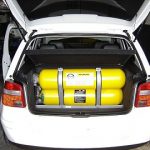The Federal Government has introduced a N2.5 billion credit scheme to support the conversion of vehicles to Compressed Natural Gas (CNG) and promote local manufacturing of conversion kits. The initiative, known as Credit Access for Light and Mobility (CALM), is designed to ease transportation and energy costs for Nigerians amid rising fuel prices.
Announced by the Presidential Compressed Natural Gas Initiative (PCNGi), the program is a collaboration between the Ministry of Finance, Credicorp, and PCNGi. It is expected to provide affordable credit options, enabling vehicle owners to transition from petrol to CNG, a cleaner and more cost-effective alternative.
Speaking at the launch, PCNGi’s Program Director, Michael Oluwagbemi, emphasized the scheme’s potential to drive domestic investment and economic growth. He noted that the initiative is not just about making consumer credit available but also about encouraging local manufacturing of CNG conversion kits, which would create jobs and support self-reliance in the energy sector.
“We have another program in development that focuses on expanding domestic manufacturing capacity for the CNG sector. This initiative will not only provide financial access to Nigerians but also encourage local production, drive job creation, and lower energy costs for all,” Oluwagbemi stated.
The government’s push for CNG adoption is part of its broader commitment to sustainable energy solutions and financial relief for citizens. By shifting to gas-powered mobility, the administration aims to reduce dependence on expensive fuel imports while promoting cleaner energy alternatives.
The CALM Fund is not the first effort to provide credit for energy transition in Nigeria. Last year, the Nigerian Consumer Credit Corporation (CREDICORP) opened applications for the CALM Fund, allowing Nigerians to access credit for CNG vehicle conversions and solar home systems.
In addition to CALM, the Federal Government launched the “Transport Fare Drop Programme” in Abuja, a partnership with the National Union of Road Transport Workers (NURTW). Under this initiative, public transport vehicles were converted to CNG for free, with the goal of reducing fares by 30-40%.
By combining consumer credit schemes with direct interventions in the transport sector, the administration hopes to make CNG a viable and widely adopted alternative to petrol and diesel, offering long-term cost savings for businesses and individuals alike.










